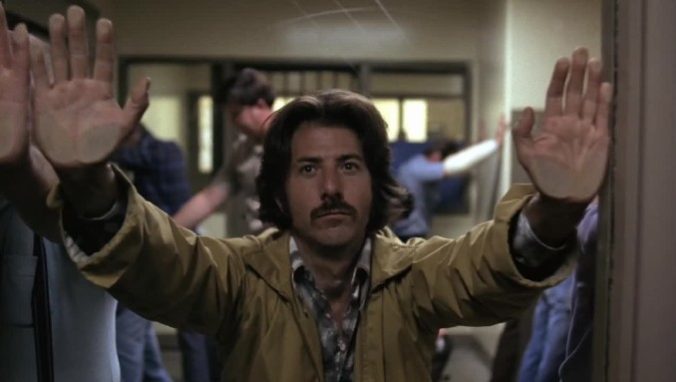Serving Straight Time with Dustin Hoffman and Ulu Grosbard

After serving a six-year sentence for armed robbery, Max Dembo (Dustin Hoffman) is released from prison without much to his name. Leaving the penitentiary gates behind him, he walks out with other former inmates who are greeted by their families in their cozy station wagons, welcoming them back to their lives. Max is alone, hopping on a bus to the city where options are scarce. As he puts it, “I just want a decent job, somebody to love me. Clothes on my back. Some self-respect.” But those things can be tough to come by when you’re walking back out into a world where the systems turn against you the moment you’re pinched for the first time, which happened for Max when he was just 12. He’s been in and out of prison ever since.
Directed by Ulu Grosbard, Straight Time is based on the novel No Beast So Fierce, which was written by Edward Bunker while he was in prison. Grosbard was taken with the novel and gave it to his friend and collaborator Hoffman (the two had previously worked together on Who Is Harry Kellerman and Why Is He Saying Those Terrible Things About Me?) and it became a pet project for the actor. Originally slating himself to direct the picture, Hoffman abandoned the position quickly into shooting. In the commentary on Straight Time’s physical release, the actor expresses regret for bowing out as director, stating that he didn’t have the courage for it at the time and kept distrusting his instincts.
This was when he called up his pal Grosbard to step into those director’s shoes, and after a little tinkering with the script—aided by Bunker, Alvin Sargent and Jeffrey Boam, ditching contributions previously made by Michael Mann and Nancy Dowd—they were off to the races. Hoffman gave his performance total priority with the decision, with his efforts speaking to his characteristic commitment to detail and authenticity he had already become known for.
The actor spent two years visiting prisons, including the L.A. County Jail and San Quentin, spending a day locked up in the latter to try to feel what it was like on the inside. “I remember more about doing that character and that performance than maybe any other film I’ve ever done,” he says. His first priority, higher than financial success (which escaped the film), was for cons and ex-cons to see the film and think “that’s it, that’s our reality.” Bunker served as an advisor on the picture, on set every day to guide Hoffman’s performance as well as the writing and directing, where he’d be able to dismiss inaccuracies.
Straight Time doesn’t spend much time behind jailhouse walls, but it was important for Hoffman to understand the psychology of an inmate in order to capture the mental state of someone trying to assimilate back into the world. Upon his insertion back into the outside, he immediately ditches his orders to report to a halfway house, something which he’s chastised for by his parole officer Earl Frank (M. Emmet Walsh) the next morning in his office. Dembo explains that he wanted to see the lights and not be told when to go to bed immediately after getting out of prison. When Frank accuses him of having an “attitude problem,” Dembo responds, “Can you tell me what kind of attitude you want me to have?” This is a man trying to toe the line to keep himself on the right side of authorities, but the lines have boxed him into an unreasonable position that in some ways is even more difficult to manage than being inside the joint.
Looking for a job, Dembo heads to a temp agency where he meets employee Jenny Mercer (Theresa Russell), who helps him find a position working for a can company cleaning trash in their factory. Dembo explains his situation to her, detailing how he can’t handle money and he can’t even drive a car without permission. He’s given such harsh limitations on what he’s able to do, yet he’s required to get a job and a place to live if he wants to achieve even a modicum of freedom and normalcy—if he doesn’t want to be under the thumb of the “justice system” ad infinitem.
Yet under their thumb he remains. Things go south for Dembo after catching up with old friend Willy Darin (Gary Busey), a former cohort who has seemingly gone straight and is settled down with a wife (Kathy Bates) and kid (Busey’s son Jake, in his first screen appearance). Visiting their home, Dembo sits at the table with this quaint family and you can watch in his sunken eyes how he reflects on the life he doesn’t have—and might never have. He wants this cozy little existence, but even his presence is a threat to their livelihood, as Darin’s wife privately asks Dembo not to visit their home anymore, because Darin doesn’t need any bad influences.
-

-

-

-

-

-

-

-

-

-

-

-

-

-

-

-

-

-

-

-

-

-

-

-

-

-

-

-

-

-

-

-

-

-

-

-

-

-

-

-








































